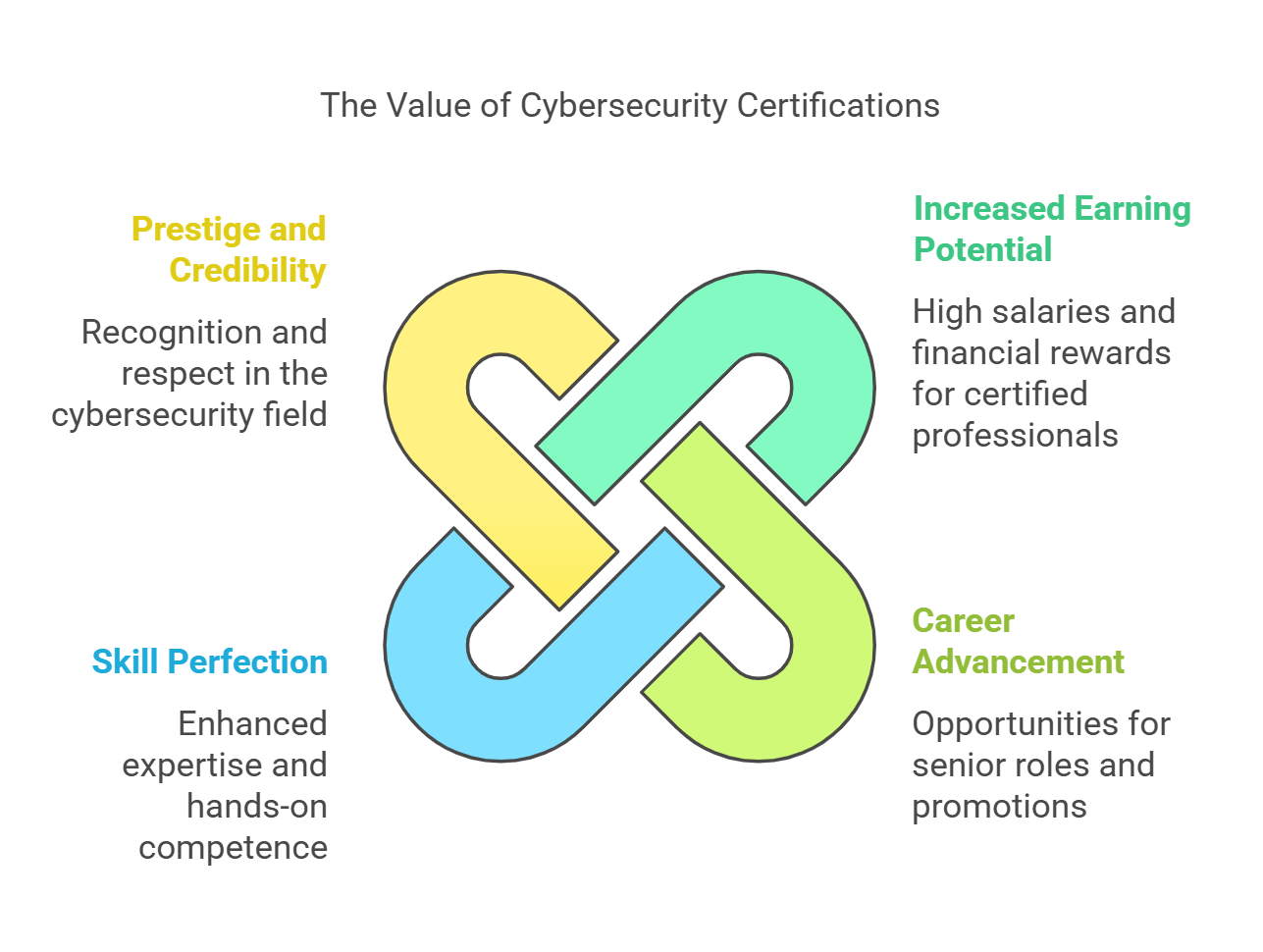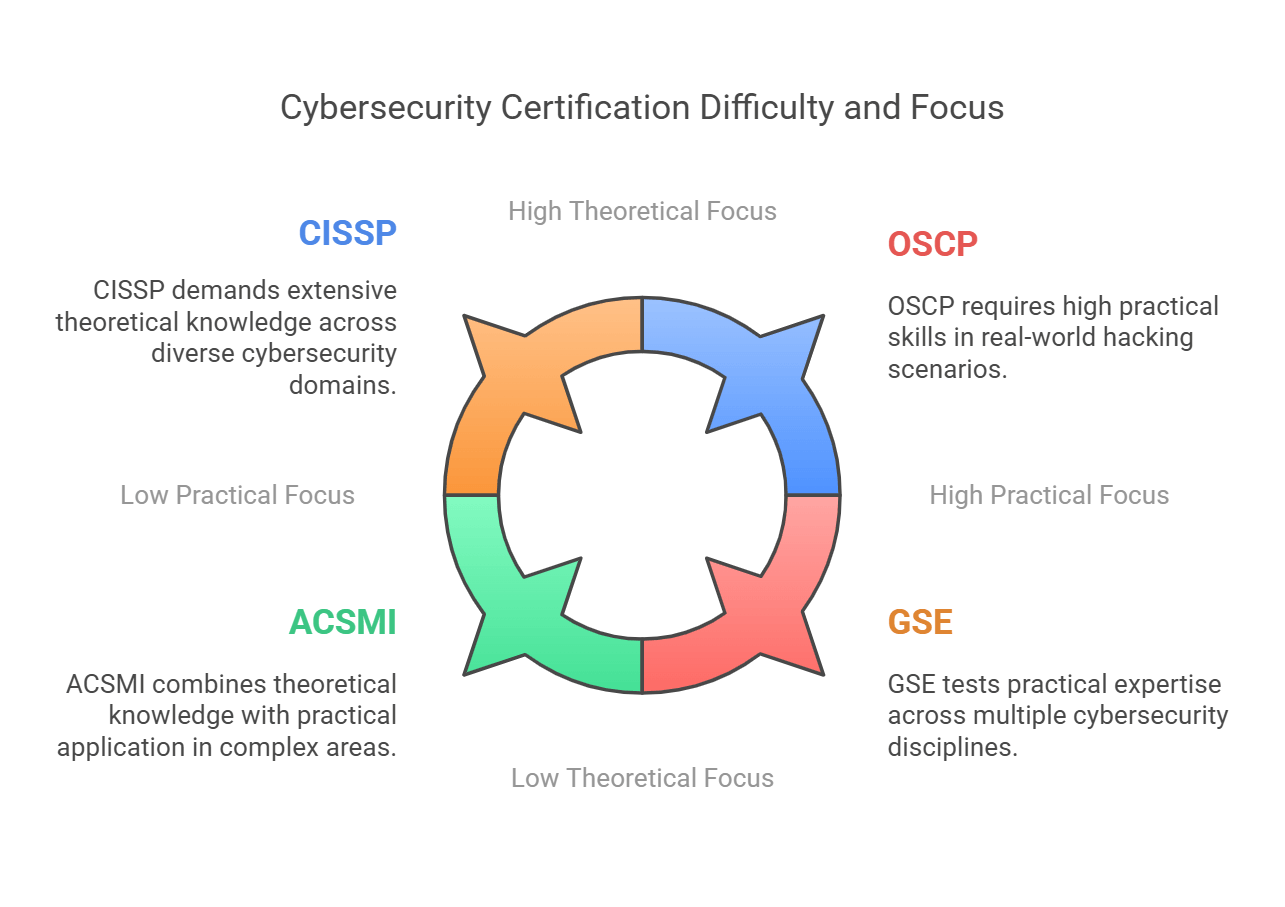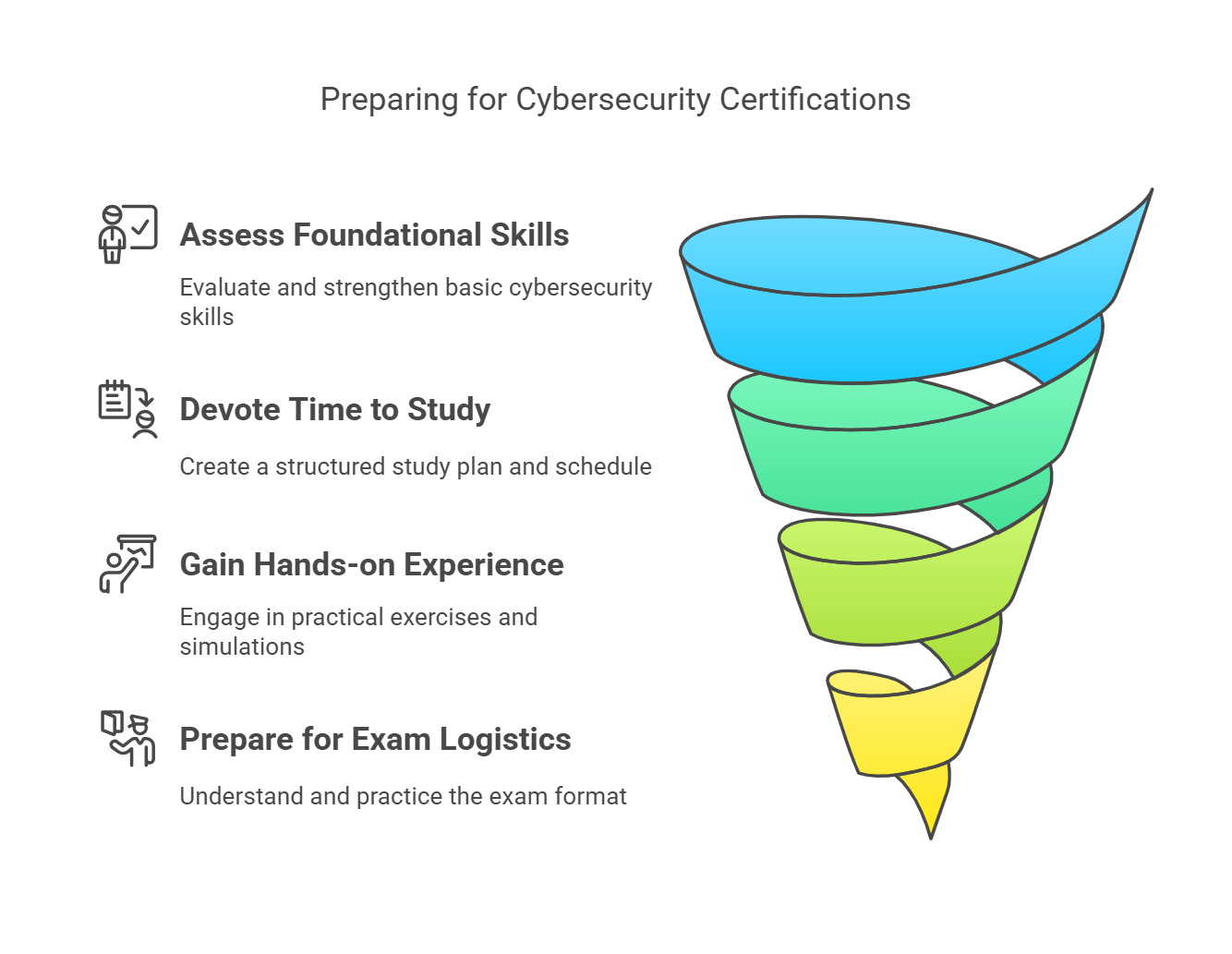Table of Contents
When you ask, "What is the hardest cybersecurity certification?", you're looking for more than just a qualification. You're seeking to elevate your career, master advanced skills, and make yourself indispensable in a world that increasingly relies on cybersecurity. The hardest certifications, often regarded as the pinnacle of cybersecurity expertise, open the doors to high-paying roles and prestigious organizations.
As the cybersecurity landscape continues to evolve in 2025, earning a tough Cybersecurity Certification Test not only boosts your credibility but also positions you as a leader in this high-demand field. This blog explores the hardest certifications in cybersecurity, what makes them challenging, and why they’re worth pursuing for anyone serious about a career in cybersecurity.
Why Pursue the Hardest Cybersecurity Certifications?
These are not just tough cybersecurity certifications, they are an investment into your future career. The difficulty of these certifications is a testament to their value. Mastering these qualifications puts you at the forefront of your industry and proves your mastery in the field.

Increased Earning Potential
The financial benefit of earning advanced level cybersecurity certifications is quite evident. Experts with top level certifications like OSCP, CISSP or GSE get salaries way higher than the industry standards. For instance, an individual with CISSP certification can receive up to $120,000 every year. High level certifications are seen as proof of expertise and specialized skills that are in demand and that makes these individuals very attractive to companies that are serious about their cybersecurity postures. Whether in the U.S., Europe or Asia, the financial return of obtaining a higher level certification is recognized across the board.
As cybersecurity threats increase in complexity, so do the rewards for those who can protect sensitive data and infrastructure. Advanced certifications are the key to six figure salaries and senior positions that not only come with additional benefits like bonuses, equity and job security but are also a stepping stone to them.
Career Advancement
Hard certifications can clearly lead to clear paths for career advancement. CISSP and OSCP are both highly valued by professionals looking to break into leadership or senior technical roles. It makes your resume stand out from hundreds of candidates and it demonstrates a depth of expertise that employers find indispensable. Many of these certifications are also prerequisites to roles like Chief Information Security Officer (CISO), Security Architect and Senior Penetration Tester.
Advanced certifications are the credentials you need to get promotions and leadership positions. Complex knowledge and proof of skills are the things that certified professionals must have, and as a result, they are frequently promoted to positions in high-level security teams, which puts them ahead of other people in the field.
Skill Perfection
The process of studying for and obtaining these certifications helps sharpen your skills. Certifications like OSCP and ACSMI require you to demonstrate hands-on competence in areas such as penetration testing, malware analysis, and risk management. These certifications go beyond theoretical knowledge and force you to apply your learning to real-world scenarios. If you're looking to enhance your expertise without financial barriers, enrolling in a Cybersecurity Certification Course Free can be a great starting point. The more challenging the certification, the more it helps refine your expertise in specialized fields, ensuring you are equipped to handle complex cybersecurity challenges.
Perfecting these skills is not only to get through the exam but to get the mindset and capabilities to help solve the most complex cybersecurity threats in the field. These certifications, including the Cybersecurity Certification Course Free options, help you to keep ahead as technology evolves.
Prestige and Credibility
Besides career growth and skill acquisition, obtaining the hardest certifications comes with a certain degree of glory. Some of the most prestigious certifications include OSCP and CISSP in the cybersecurity domain. When you are certified in one of these, you are not only proving your knowledge, but your dedication to the cybersecurity field. These certifications are well regarded by employers and peers and become a significant asset to your professional profile.
Achieving certifications also enhances your visibility within your network. Being recognized as an expert in a specific field can lead to public speaking, consulting, and collaborations on big projects in the cybersecurity field.
What Is the Hardest Cybersecurity Certification in 2025?
As of 2025, the hardest cybersecurity certifications still include those that require a mix of hands-on experience, theoretical knowledge, and real-world applications. The certifications that stand out include OSCP, CISSP, ACSMI, and GSE. Each of these certifications challenges professionals in different ways, but they all have a common trait: they test your ability to perform under pressure and solve real-world problems.

Offensive Security Certified Professional (OSCP)
OSCP is widely recognized as one of the toughest cybersecurity certifications, for penetration testers. The OSCP is unique among certifications in that it is based on a 24-hour practical exam that finds candidates hacking into a number of systems. The OSCP is a performance-based certification, your skills are tested in a real-time environment, and you think on your feet and utilize many tools and techniques.
Why OSCP Is Difficult:
-
Hands-on Learning: The OSCP exam consists entirely of practical scenarios where you must exploit vulnerabilities and document your findings. The absence of theoretical questions increases the difficulty.
-
Time Pressure: The 24-hour exam is intense, and candidates must manage their time effectively to complete all tasks.
-
Advanced Skills Required: Topics like buffer overflow, privilege escalation, and pivoting require advanced knowledge and the ability to adapt quickly to different hacking scenarios.
Passing the OSCP is a clear demonstration of your penetration testing capabilities and technical expertise and achieving it requires intense preparation, but the career opportunities it unlocks reflect that.
Certified Information Systems Security Professional (CISSP)
CISSP is a leading certification that proves your proficiency in cybersecurity and is especially valuable for leaders and managers. CISSP covers in-depth knowledge across eight domains, such as risk management, access control, and software development security. It’s not just a technical certification; CISSP also tests your capability to develop and implement effective cybersecurity strategies and policies.
Why CISSP Is Difficult:
-
Wide Range of Topics: CISSP covers an expansive range of topics, each requiring extensive understanding and study.
-
Experience Requirement: To sit for the exam, candidates must have at least five years of professional experience in the field of cybersecurity.
-
Adaptive Exam: The CISSP exam is adaptive, meaning questions become more difficult based on your previous answers, adding a layer of complexity.
CISSP is one of the most comprehensive certifications in the field, demanding years of experience and study to fully grasp its breadth. This makes it one of the hardest but most rewarding cybersecurity certifications available.
ACSMI Certification
ACSMI certification is emerging as one of the most challenging cybersecurity certifications in 2025. ACSMI has over 400 modules that cover industrial control systems, SCADA systems, and cloud security, among other topics. The certification is both theory-based and practice-oriented, thus ensuring that the candidates possess the right skills to counteract complex cyber threats.
Why ACSMI Stands Out:
-
Extensive Curriculum: With over 400 modules, ACSMI covers some of the most complex areas of cybersecurity, including the Internet of Things (IoT), cloud security, and advanced malware defense.
-
Real-World Simulations: ACSMI uses practical labs and simulations to mimic real-world cybersecurity scenarios, ensuring that you’re prepared for the challenges faced by professionals in the field.
-
Mid-Level to Advanced: This certification is ideal for those who already have some experience in cybersecurity and are looking to move into more advanced roles.
ACSMI is for professionals who want to move further into specific areas of cybersecurity and build their hands-on skills. It is a certification that is invaluable to anyone looking to seriously learn cybersecurity.
GIAC Security Expert (GSE)
The GSE certification is a multi-day, end-to-end exam meant for Cybersecurity experts. The candidates are tested on multiple domains which include Incident Handling, Digital Forensics and Network Security. The GSE is one of the hardest certifications to earn, you can’t even sit for the exam until you pass several GIAC certifications to earn the GSE.
Why GSE Is Hard:
-
Multiple Disciplines: The GSE exam requires expertise across several GIAC certifications, including GCIH, GCFE, and others.
-
Length and Complexity: The GSE exam lasts multiple days and combines written and practical components, which tests both theoretical knowledge and hands-on abilities.
-
Real-World Application: Candidates must demonstrate their ability to apply cybersecurity principles in complex, real-world scenarios.
The GSE is a benchmark for cybersecurity professionals, requiring extensive knowledge, hands-on experience, and the ability to handle a broad range of cybersecurity challenges.
How to Tackle the Hardest Cybersecurity Certifications
When approaching the hardest cybersecurity certifications, preparation is key. These certifications demand more than just memorizing concepts—they require you to apply your knowledge in practical, high-pressure environments.

Assess Your Foundational Skills
Before attempting a difficult certification, it’s crucial to ensure that your foundational skills are strong. Certifications like CompTIA Security+ or ACSMI can help you build the base knowledge required for more advanced certifications. If you're not confident in your networking or programming skills, it’s advisable to spend time strengthening these areas before tackling the hardest certifications.
Devote Time to Study
Achieving the hardest certifications is a process that requires a lot of time and effort. For exams like CISSP or OSCP, it is recommended to study for a long time, especially if you are planning to set aside a significant amount of time for preparation. Making a study schedule, using online labs, and solving practice exams will also help. You do not want to be without structure when it comes to studying because that will help you stay focused and organized.
Gain Hands-on Experience
This is where the theory they have learned comes into practice as hands-on experience is the best way to learn cybersecurity concepts. At home you can set up a home lab or if you lack the resources you can use virtual environments provided by ACSMI to simulate real-world attacks and defenses. These practical exercises will make sure that you are ready for the hands-on components of certifications like OSCP and ACSMI.
Prepare for Exam Logistics
All certifications have different exams and conditions; however, OSCP is 24 hours long and has strict time management policies. Make sure you know what kind of exam you will be taking and what to expect. Get information about the testing environment and solve practice exams to gain confidence.
Conclusion:
Understanding “What is the hardest cybersecurity certification?” depends on your career aspirations and the level of expertise you wish to achieve. Whether you pursue OSCP, CISSP, ACSMI, or GSE, each certification offers its own set of challenges, but all guarantee significant rewards in terms of career growth and salary. With the right preparation, these certifications will help you master the art of cybersecurity and distinguish yourself in this competitive field.
Start your certification journey today, and unlock the doors to the future of cybersecurity!
FAQs About Difficult Cybersecurity Certifications
1. Why should I pursue a difficult cybersecurity certification?
Difficult certifications open doors to advanced roles, increase earning potential and establish professional credibility. They also help sharpen your skills and make you stand out in the competitive cybersecurity field.
2. What’s harder—OSCP or CISSP?
Both certifications are highly challenging, but the difficulty varies depending on your skill set. OSCP is practical and focuses on penetration testing, while CISSP is more theoretical and covers a wide range of cybersecurity topics.
3. Is ACSMI certification suitable for experienced professionals?
Yes, ACSMI is designed for mid-level professionals who want to deepen their expertise and specialize in areas like cloud security, industrial control systems, and advanced malware defense.
4. How much time is needed to prepare for certifications like CISSP or OSCP?
Preparation typically takes 3-12 months depending on your background and the certification's difficulty level.
5. Can online resources help me clear tough certifications?
While online resources are helpful, hands-on practice is crucial. Many advanced certifications, such as OSCP and ACSMI, require you to gain real-world experience through labs and simulated attacks.
6. Can someone transition into cybersecurity and tackle difficult certifications?
Yes, individuals transitioning into cybersecurity can succeed with the right foundational certifications and hands-on practice. Programs like ACSMI provide structured learning to help build the necessary skills.
7. Do hard certifications guarantee high-paying jobs?
While hard certifications don’t guarantee specific jobs, they increase your chances of securing high-paying roles due to the advanced skills and credibility they confer.
8. Are ACSMI modules updated regularly?
Yes, ACSMI updates its modules frequently to reflect the latest trends, technologies, and cybersecurity threats, ensuring that certification holders are well-prepared for the evolving field.

Leave a Reply